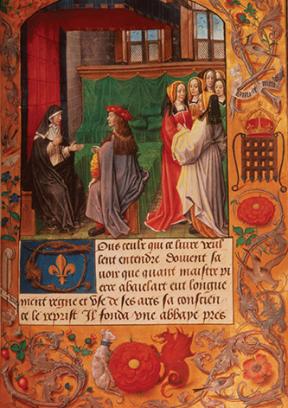Beyond the Cloister
In the 1530s, the dissolution of England's monasteries was a central component of Henry VIII's Protestant Reformation. Decades later, the effects of this change in English culture and religious identity were still being felt. Catholic Englishmen and women who wished to profess their faith were driven into exile on the continent, where monastic communities became literary centers in the 17th century. The writings of the women who became nuns, and those who remained Catholic in England, are the focus of research by Jenna Lay.
Lay, assistant professor of English, explores the effects of nuns and recusant women on 16th- and 17th-century literature. The author of the forthcoming book Beyond the Cloister: Catholic Englishwomen and Early Modern Literary Culture, she scrutinized English and French archives to examine what Catholic women were writing. Her work demonstrates that nuns and recusant women, whom most consider marginal figures because of their gender and religious identity, are centrally important to an understanding of how literature works in the early modern period.
"There's fantastic manuscript evidence there because these convents were often grounded in a model of collective authorship," Lay says. "Nuns were working together to produce manuscripts that dealt with questions of religious practice, national identity and obedience. How, for example, does one define religious and political obedience when religious allegiance is to the Catholic Church but one's political allegiance is to England? It led nuns to write fascinating materials on how obedience is a contingent category, as an individual may display forms of disobedience when she recognizes true obedience as ultimately based on her relationship to God."
Through archival work, Lay explored how the political and social turbulence of the time enabled nuns and recusant women to have surprising effects on English literature. Her work reveals that cloistered women were anything but invisible. Through their manuscripts and printed books, nuns actively participated in political and religious discourse. Lay shows how their literary influence shaped the texts of our most canonical authors, including Christopher Marlowe, William Shakespeare, Andrew Marvell, John Donne and John Milton.
Posted on:


